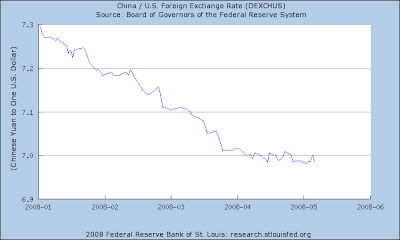What lowest NYSE volume implies
A nice piece from Barry Ritholtz on today’s YTD lowest NYSE volume. Lowest volume rally is a bear market rally and implies short coverage.
Alternative to buying up foreign land
China, where self-sufficiency in food is coming under pressure as a richer population consumes more meat, is considering whether to make support for offshore land acquisition, in places such as Africa and South America, an official government policy. A private-equity group in the United Arab Emirates is buying land in Pakistan with government support, while other resource-rich but food-poor nations – oil producers such as Saudi Arabia and Libya – are looking abroad to secure their food supplies.Foreign investment in agricultural land should not be a problem. One recent estimate is that 15 per cent of all purchases of UK agricultural land are made by foreign investors. Even more than a power station or a yoghurt producer – which have caused rows about foreign investment in recent years – farmland is a fixed asset. Foreign investors bring capital, expertise and markets; they are a good thing.
China inflation up 8.5% in April
Krugman, oil nonbubble
Paul Krugman today argues in NY Times that we don’t have oil bubble. His usual argument is that if this was speculation, there should be an inventory buildup. I think he’s wrong and his argument is inconsistent.
First, oil demand, just like food, can be very inelastic, i.e., demand will not fall much even with rising oil price. For the same reason, with a small decrease of supply, even without much increase of demand, price can rise sharply.
Second, Krugman himself admits due to driving habit, infrastructure layout, and policies, it’s very hard for people to adjust their behavior within a short period of time.
I tend to think the current runup of oil price is mainly due to falling dollar, supply constraint, and most importantly, speculation. What differs from previous times is the availability of a lot of new financial instruments for both institutional and individual investors to speculate on oil and other commodities. Yes, I have ETF in mind.
Peter Bernstein: When Should the Fed Crash the Party?
Peter Bernstein repudiates on NY Times the view that the Fed should let market crash and sort out the excesses by itself. A lot of prominent investors, such as Jim Rogers held such view.
Bernstein thinks “today’s authorities are taking risks and are going to make mistakes in managing the complex fallout from the speculative fevers of recent years. Nevertheless, I would still reject Mellon’s advice and those who echo it, because the consequences would be unthinkable.”
What was Mellon’s advice?
In the darkest days of the Depression, Treasury Secretary Andrew W. Mellon, one of the richest men in the United States, opposed any government action to stem the tide of plunging business activity and soaring unemployment. Instead, he urged a policy of supreme indifference.
“Liquidate labor, liquidate stocks, liquidate the farmers, liquidate real estate,” he said.
“It will purge the rottenness out of the system,” he added, and values “will be adjusted, and enterprising people will pick up the wrecks from less competent people.”
Bernstein’s question also echoes the debate in academia whether the Fed should prick the bubble so to avoid large market correction and economic fluctuations later on. It also goes back to the fundamental question whether the Fed can micro-manage business cycles and whether the Fed often does more harm than good in the process.
Two related readings:
Bernanke on “Asset Bubble and Monetary Policy“
Another piece on VOX, “Can Monetary Policy Be Used to Stabilize Asset Prices“
Where is ‘scale of economy’ in Chinese agriculture?
To follow up yesterday's post on China's food production, I think Financial Times proposed the right policy: for China to be largely self-sufficient on food, establishing scale of economy in agriculture is the key, that is, get rid of fragmented farming, improve productivity by reorganizing how agri-industry operates.
Is the Commodities Boom Driven by Speculation?
"On a slow afternoon, trader A decided to open a market for a can of sardines. Bidding started at $1. B bought it for $2 and sold it to C for $3. D and E decided to get into the act, with the result that E became the owner for $5.E decided to open the can and discovered the sardines had gone bad. He went back to A to get his money back, protesting that the sardines were rotten. A smiled broadly, and said, " You don't understand. Those were trading sardines, not eating sardines."


